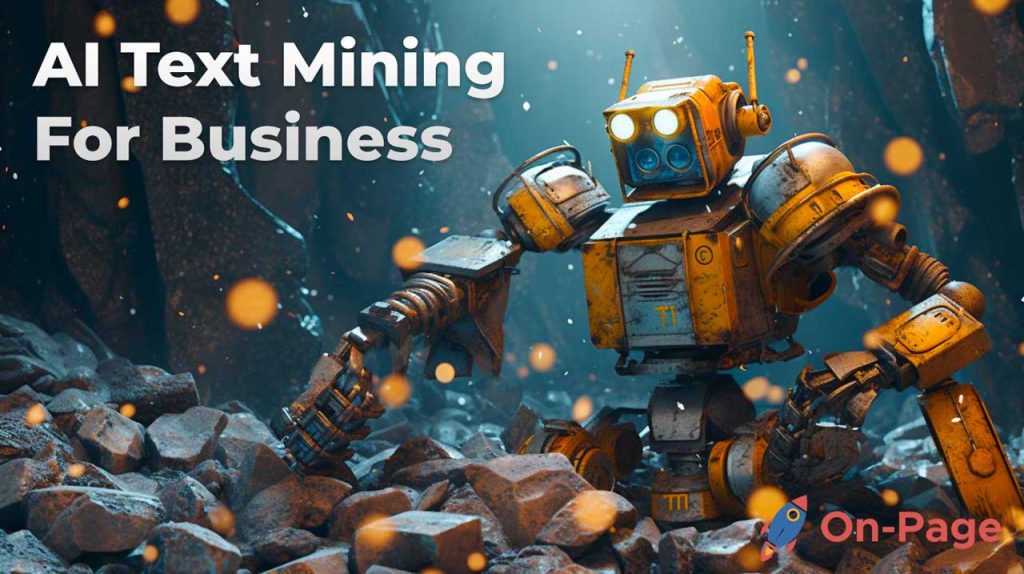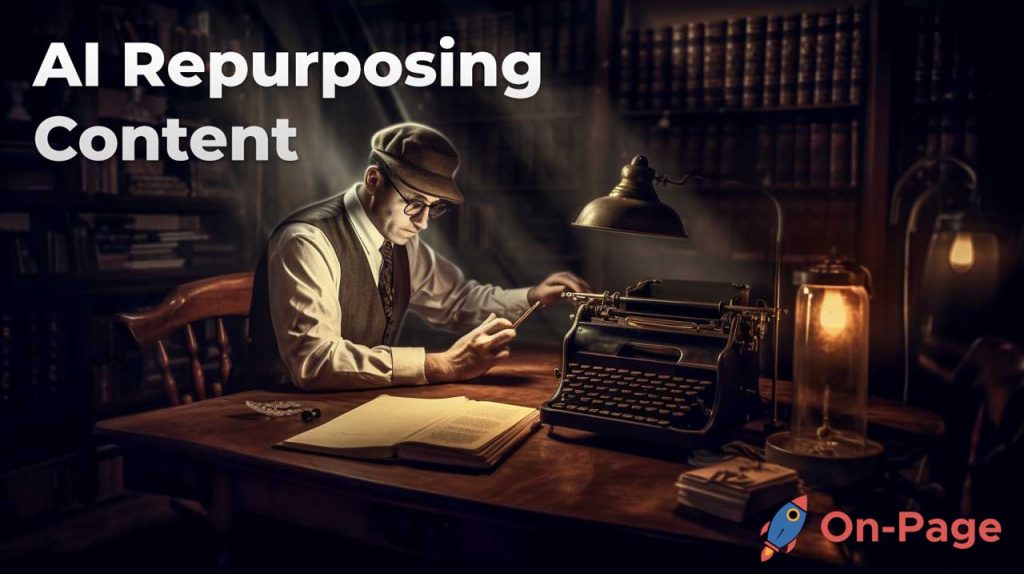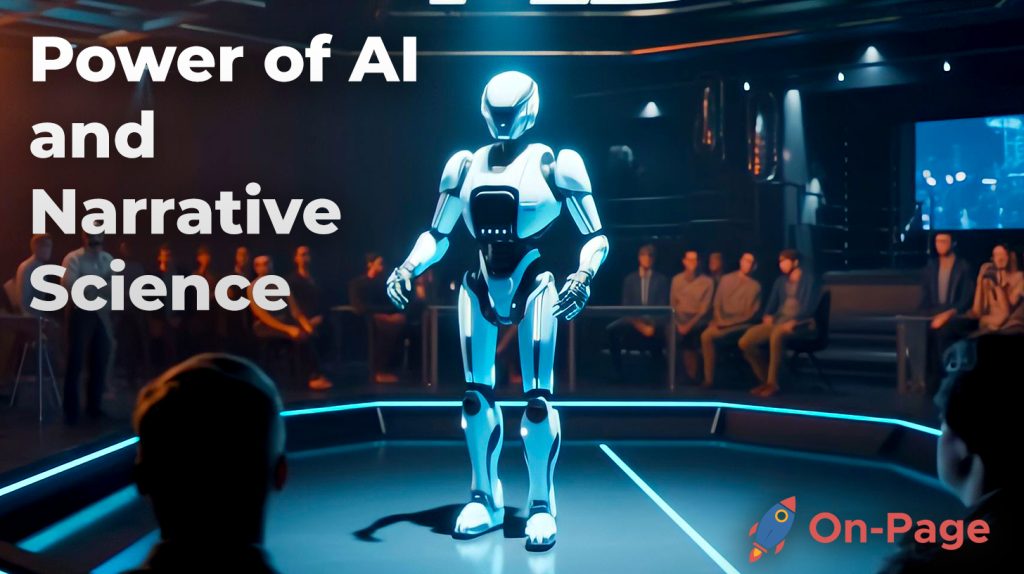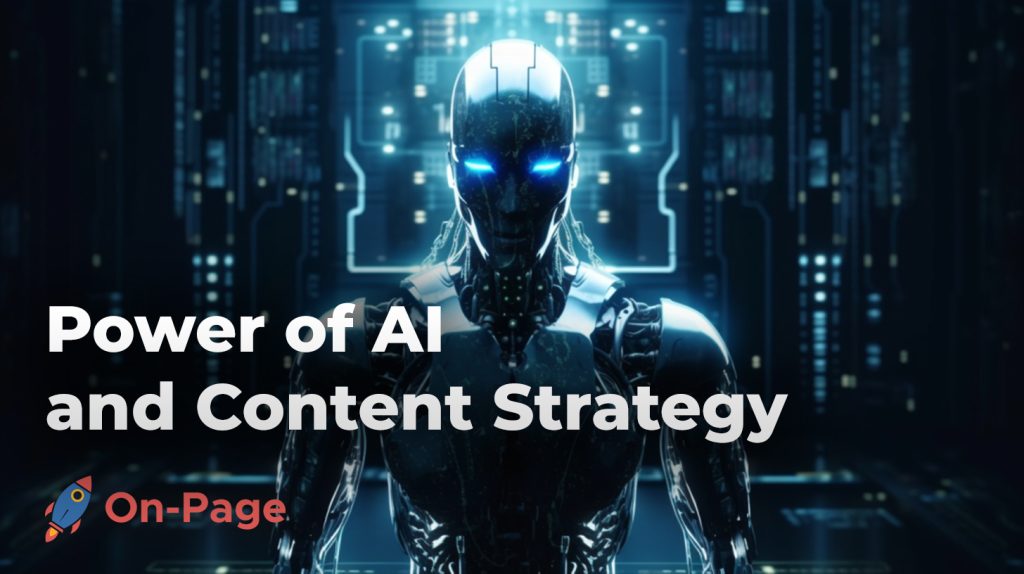
Imagine if you could unleash a force that effortlessly analyzes your target audience, optimizes your content strategy, and ultimately skyrockets your business’s online visibility. Now stop imagining, because this powerful weapon is a reality – it’s called Artificial Intelligence (AI), and when combined with an expert content strategy, it’s the game changer your business has been waiting for.
In this blog post, we will unveil how AI-driven insights and tools like On-Page.ai can bring your SEO optimization efforts to new heights and solidify your brand’s presence in today’s competitive digital landscape. Curious about supercharging your business growth? Keep reading to find out how powerful AI-engineered SEO optimization can transform your goals into achievements.
AI is transforming content strategy by providing valuable insights and assisting content creators in producing high-quality, tailored content. From generating topic ideas to identifying optimization opportunities within existing content, AI can supercharge productivity, creativity, and audience reach. This article explores the various ways in which AI is impacting content strategy, offering businesses a blueprint for adopting this exciting new technology.
The Essentials of Content Strategy

Creating content can be an overwhelming task, especially if you don’t know where to start. That’s where content strategy comes in. Content strategy is the process of planning, creating, publishing, and managing content that supports your organization’s goals.
Define your target market
The first step to creating a successful content strategy is defining your target audience. Who are you trying to reach? What are their interests and pain points? Understanding your audience will help you create content that resonates with them.
Know your goals and objectives
Next, you need to establish your goals and objectives. What do you want to achieve with your content? Generating leads, building brand awareness, or driving sales? Your goals should be specific, measurable, and aligned with your overall business objectives.
Develop a content plan
Once you know your audience and goals, it’s time to develop a plan for creating and distributing your content. This includes identifying the types of content you’ll produce (blog posts, videos, podcasts), determining how often you’ll publish, deciding on the channels you’ll use (social media, email marketing), and mapping out the buyer’s journey.
Integrating AI into Content Development
Integrating AI into your content development process can enhance your ability to understand what makes good content from a quantitative perspective. AI-driven tools like On-Page.ai can help streamline the research process by providing topic ideas based on keyword analysis and trending topics. These tools enable writers to go beyond simple keyword research and provide a platform for discovering more creative ways of approaching topics.
Additionally, AI-powered grammar checkers can assist in refining language and readability levels within copywriting. However, relying too heavily on these programs can lead to the loss of creative flair found in more authentic writing styles.
The incorporation of data analysis tools within an AI-powered program greatly helps in understanding performance metrics for published digital pieces. This allows users to identify trends or patterns around what type of copy performs well with target audiences, leading to better optimization and improved content strategies. Give On-Page SEO tool a shot if you’re looking to use AI to revamp your content strategy, boost search engine visibility, and get more potential leads.
To summarize, integrating AI within your content development process enables writers and businesses to make data-driven decisions, resulting in copy that not only resonates creatively but also performs technically at the highest standards. The offloading of research themes and grammatical checks allows you to devote more time to other creative aspects of digital writing while benefiting from automated tools that enhance the overall delivery of strategy.
AI-Driven Research and Topic Generation

One of the most powerful applications of AI in content strategy is its ability to conduct extensive research and generate topics that align with user intent. The traditional approach to content research typically involves manually analyzing search engine results, social media trends, and competitor analysis. However, this process can be time-consuming and often lacks insights that are specific to your target audience.
On the other hand, AI-powered tools can efficiently analyze large sets of data and identify unique patterns that can shape your content strategy. For instance, On-Page.ai’s Stealth Writer tool crawls through millions of articles and uses machine learning capabilities to understand your target audience’s interests, preferences, and pain points. This enables users to identify gaps in their existing content strategy and develop new topics that are highly relevant to their audience.
To put it simply, AI-driven research is like having a virtual assistant that scours the internet for relevant information on your behalf. It takes care of the tedious work so that you can focus on creating high-quality content that resonates with your audience.
Furthermore, AI tools can provide valuable data insights on how users interact with particular types of content. This data spans beyond traditional metrics like page views or time spent on a page; instead, it provides insights into factors such as user engagement levels, sentiment analysis (whether language is positive or negative), click-through rates (CTR), and more.
Let’s say you have an online retail store specializing in eco-friendly products. By using AI-powered analytics tools, you could uncover various subtopics within this niche that resonate well with your target audience. Through analyzing data from multiple sources such as social media platforms or online forums, you could find out which keywords or phrases are being used the most frequently by eco-conscious consumers.
This is exactly what On-Page.ai‘s Topical Keyword Search feature does so you can take advantage of relevant keywords and phrases your target customers search on Google–and build your expertise about those topics.
Once you’ve identified a list of potential topics for your content strategy using an AI-driven approach, the next step is to optimize your language and grammar to ensure maximum engagement.
Grammar and Language Optimization

The beauty of AI tools in content strategy lies in their ability to not only automate large portions of the research and topic-generation process but to also help you refine your language and grammar. Writing high-quality content requires an in-depth understanding of grammar rules, style guides, and the ability to convey complex information in an engaging manner.
With the help of AI, grammatical errors can easily be spotted and corrected. For instance, On-Page.ai’s Stealth Writer tool is integrated with a grammar and spelling checker that analyzes your text for common typos and grammar errors.
By automating this process with AI, writers can quickly spot issues that they may have otherwise missed when editing their work manually. This saves time while improving the overall quality of content for readers who may become frustrated with poor grammar or awkward sentence structure.
However, some critics argue that relying too heavily on AI-assisted proofreading could lead to a decline in writing skills among humans. They believe that by outsourcing this work to machines, writers miss out on opportunities to improve their own skills and become better at their craft.
While it’s important to acknowledge these concerns about AI-assisted proofreading tools’ impact on writing development, remember that these tools aren’t designed to replace human writers completely. Instead, they’re meant to complement our natural abilities by automating mundane tasks (such as checking for grammar mistakes) so we can focus on improving other aspects of our writing such as creativity or storytelling.
To illustrate this point further, imagine a journalist writing an article about a recent political issue. The journalist may spend hours reading through research and interviews to get the full picture, but may still overlook a crucial detail or make an error while writing. This can lead to miscommunication and misunderstandings among readers.
However, with AI-assisted editing tools like Grammarly, writers can quickly spot and correct any grammatical errors before publishing their work. This automation not only saves time but also ensures that the final product is polished and well-received by readers.
Content Performance Analysis
To truly measure the success of your content strategy, you need to rely on data and analytics. Fortunately, with AI-powered content performance analysis tools, this has never been easier. By gathering insights into how your content is performing, you can make more informed decisions about future content development and tailor your strategy to align with your business goals.

For instance, let’s say that after publishing a blog post on your website, you notice a spike in traffic and engagement. With traditional analytics tools, it may be difficult to determine why that particular post performed well. However, by leveraging AI-driven content analysis, you may find that there were certain keywords or topics that resonated particularly well with your audience. Armed with that information, you can optimize future posts accordingly for even better results.
In addition to granular insights into individual pieces of content, AI-powered analytics can also help identify broader trends and themes across your content portfolio. Based on this data, you might discover opportunities to create new and engaging content formats (such as videos or interactive quizzes) or invest more heavily in certain topics or verticals where you’ve seen outsized success.
Some critics of AI-powered analytics argue that by solely relying on data to inform content strategy decisions, businesses miss out on the “human touch” that makes great content truly resonate with audiences. While there is certainly an element of truth to this argument, it’s important to remember that AI is just one tool in a larger arsenal of resources available to businesses. When used thoughtfully and in conjunction with human creativity and ingenuity, AI-driven analytics can actually enhance the quality and relevance of your content offerings.
- A survey conducted by the Content Marketing Institute revealed that 54% of marketers reported using AI-powered tools in their content marketing strategies, resulting in improved efficiency and effectiveness.
- According to a report by Deloitte Insights, improving AI’s role in content strategizing can lead to a 25% acceleration in time-to-market for new campaigns and content launches.
- In a study published in the Journal of Marketing Management, it was found that incorporating AI into content strategies led to a 27% increase in engagement rates among target audiences across different industries.
Benefits of AI in Content Strategy
Now that we’ve explored some of the specific ways AI can help evaluate and improve your existing content strategy, let’s touch on some broader benefits of integrating AI into your content development and distribution efforts.
Understand your target customers
First and foremost, AI can help you better understand your target audience. By analyzing data on how users behave on your website, what topics they engage with most (including those in which they convert to purchase), and other key metrics, you can build more accurate buyer personas and understand your audience’s pain points, interests, and motivators in a more profound way than ever before.
Develop relevant content
Armed with these insights, you can develop more targeted and personalized content that speaks directly to your audience’s needs. This not only improves the relevance of your content offerings but also increases engagement rates, and conversions, and ultimately drives revenue growth.
Laser-focused messaging
To use an analogy, consider the traditional marketing approach of “spray-and-pray.” In this scenario, businesses would produce generic messaging that appealed to broad swaths of consumers in the hopes that some would take notice. With AI-powered targeting and personalization, however, businesses can shift towards a “sniper rifle” approach, honing in on specific individuals or segments with highly tailored content experiences designed to drive meaningful engagement.
Real-World AI Applications and Success Stories
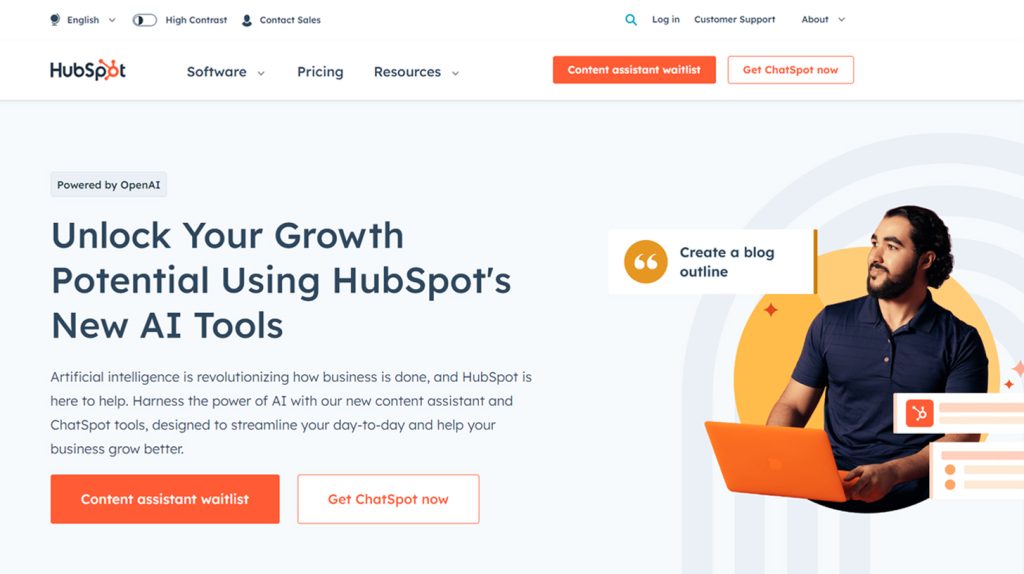
Artificial Intelligence has already revolutionized the way we create, optimize, and distribute content for different platforms. From identifying audience preferences to crafting personalized content, AI is continuously helping businesses to achieve their marketing targets more efficiently. Let’s explore some of the real-world AI applications and success stories to better understand how businesses can leverage AI technology for their content strategy.
In 2018, HubSpot launched a new version of its content strategy tool powered by artificial intelligence called “Content Strategy.” This tool uses natural language processing (NLP) to analyze existing content on a website and identify gaps in content that should be filled. Additionally, it provides recommendations on how to address those gaps by suggesting the right topics, keywords, questions, and subtopics that a business should cover in its future posts. HubSpot reports that businesses using Content Strategy saw an increase in blog post views by an average of 106% per month over three months.
One such example of a company benefiting from AI technology is the Los Angeles Times, which integrated a variety of algorithms into its workflow. These algorithms allowed them to recommend relevant articles based on user behavior and purchase history. They also used chatbots to personalize customer interactions with responses tailored directly to customer interests. Such personalization improved online engagement by 60%, email open rates by 141%, and conversions by 70%.
However, despite these impressive results, there is still skepticism about the implementation of AI in content creation and distribution. Some experts believe that algorithms may take over jobs once held by human writers while others argue that the efficiency gains outweigh any lost jobs. The ongoing debate focuses largely on whether or not AI machines can truly recreate the contextual understanding of human communication as well as its nuances such as irony or subtlety.
To think about it another way, consider the relationship between a violinist and her instrument. Playing with an orchestra, the violinist does not have to think about each individual note – instead, she is focused on the overall product. AI technology can similarly act as an instrument for content creators. By taking care of routine tasks like grammar checking or SEO content optimization, marketers and writers can focus more on the overall quality and relevance of their content.
Even though there is room for improvement in terms of integrating AI into content strategy, businesses continue to see positive results from its application. One success story is from TUI Nordic, which introduced chatbots for its customer service using Natural Language Processing (NLP) technology to analyze and respond accurately based on natural language questions. By doing so, they were able to reduce calls to their call center by 50%, saving time and money while delivering high-quality customer experience.
In conclusion, AI technology already shows immense promise when integrated seamlessly into your content strategy as demonstrated by real-world success stories. Fortunately, On-Page.ai offers a comprehensive suite of services such as On-Page Scans, Stealth Writer, and Stealth ReWriter that can help optimize your content better than ever before.
By leveraging cutting-edge Artificial Intelligence capabilities fully integrated into our platform, On-Page.ai takes care of routine tasks while providing insight-based recommendations designed to help improve online visibility and engagement. So why wait? Unlock the power of AI today with On-Page.ai!
FAQs
What are some successful examples of using AI in content strategy?
There are numerous successful examples of how AI has been implemented to enhance content strategy for businesses.
- One such example is Netflix‘s use of AI algorithms to personalize its recommendations for subscribers, resulting in a 75% increase in user engagement (source: Forbes).
- Another example is the Associated Press‘ use of Automated Insights’ Wordsmith platform to create over 3,000 earning reports in seconds with high accuracy rates (source: Entrepreneur).
- Additionally, IBM’s Watson has been utilized by The North Face to provide personalized product recommendations based on customers’ preferences and needs, leading to a 60% higher click-through rate and a 75% higher likelihood of making a purchase (source: DigitalCommerce360).
These successful implementations demonstrate that AI can significantly improve content strategy by creating personalized and targeted content that resonates with customers. With the power of AI, businesses can analyze vast amounts of data, identify patterns and trends, and deliver customized experiences that drive customer engagement and satisfaction. As we move forward into the future, it’s clear that AI will continue to play an increasingly important role in shaping content strategy for businesses looking to stay ahead of the curve.
What skills are required for a content strategist working with AI?
The role of a content strategist has evolved significantly over the years, especially with the integration of AI. To excel in this field, there are several skills that are essential for success:
1. Understanding AI technology and its applications in content creation and marketing is crucial. According to Statista, the global AI market is expected to reach $118 billion by 2025, indicating that AI is becoming increasingly important in various industries.
2. Strong analytical skills are a must-have for any content strategist working with AI. The ability to interpret data and analytics accurately can help make more informed decisions about content creation and distribution.
3. Creativity allows content strategists to develop unique solutions that stand out from the competition. 60% of marketers named creativity as the most essential soft skill for success in their roles.
4. Knowledge of SEO principles and keyword research techniques is vital in creating an effective content strategy that aligns with your targeted audience’s interests and needs. Of course, to perform SEO tasks more efficiently, content strategists should choose a powerful AI content optimizer like On-Page.ai to help them craft impactful content.
5. Excellent communication skills combined with adaptability and flexibility are critical to ensure smooth collaboration between teams working on different aspects of an AI-driven content strategy.
In conclusion, a successful content strategist working with AI should have a combination of technical competency, analytical skills, creativity, strategic thinking ability, communication skills, and the ability to adapt quickly to changes in the market. The importance of these skills cannot be overstated while crafting dynamic and engaging content strategies using AI technology.
In what ways can AI enhance the user experience of content?
AI has completely transformed the world of content marketing. By utilizing natural language processing, machine learning, and predictive analytics, AI has enabled marketers to target users with personalized and relevant content that enhances their overall experience.
One way AI can enhance user experience is by providing personalized recommendations based on a user’s past behavior. According to a report by Segment, 44% of consumers say that they will likely become repeat buyers after a personalized shopping experience. This is because users appreciate when companies understand their interests and needs and can recommend products or services that align with them. AI technology can analyze billions of data points, including search history, purchase behavior, and social media activity to provide users with highly targeted content.
Another way AI can enhance user experience is through chatbots. Chatbots are an automated messaging system that interacts with users in a conversational manner. They can help provide quick answers to frequently asked questions, thus reducing the workload on customer support teams. According to Business Insider, 67% of businesses believe that chatbots will become increasingly important in the next five years. Users appreciate quick responses to their queries, which leads to higher customer satisfaction levels.
Finally, AI can enhance user experience by creating more engaging content formats like videos and animations. Many online video creation platforms now offer AI-powered tools that analyze text and turn it into dynamic visual content. This approach helps convey information in an exciting way that keeps users engaged longer–a critical factor since attention spans have decreased in recent years.
How has the integration of AI impacted content strategy?
The integration of AI has revolutionized the way content strategy works. With their ability to process and analyze vast amounts of data, AI tools provide businesses with insights into customer behavior that were once impossible to obtain.
One major impact of AI on content strategy is the ability to personalize content for individual users. By analyzing a user’s behavior and preferences, AI systems can recommend relevant content that is likely to be of interest to them. This approach has proven successful, with research showing that personalized content drives higher engagement rates and an increase in sales conversion rates by up to 20%.
AI also plays a significant role in creating the content itself. Language generation technologies such as GPT-3 can automatically generate high-quality articles, product descriptions, or even social media posts with ease and speed. This not only frees up the time of human writers but also allows businesses to create more content at a faster pace.
However, while AI can provide valuable insights and enable greater efficiency, it should not replace human creativity entirely. Content produced by algorithms may lack the emotional depth and nuance that human writers can bring, thus making it less engaging for readers.
In conclusion, the integration of AI has transformed content strategy by enabling personalization and automation. Businesses should see this as an opportunity to augment rather than replace human creativity in the content creation process.
What challenges do companies face when implementing AI into their content strategy?
Companies that are planning to implement AI into their content strategy may face several challenges during the implementation process. One of the most significant challenges is obtaining high-quality data for AI systems to analyze and learn from. Studies suggest that businesses struggle with poor data quality, which can make it difficult for organizations to achieve their desired outcomes when working with AI algorithms.
Another challenge is the cost of implementing AI systems and the lack of skilled professionals capable of handling complex technologies like AI. The cost of acquiring and maintaining advanced technologies can be prohibitive, especially for small-to-medium organizations. Additionally, according to a report by PwC, sixty-seven percent of business leaders believe that a skills shortage is an obstacle to implementing AI in their organization.
Also, there is concern about privacy issues due to sensitive data being processed by AI systems. Regulations like GDPR and CCPA already require companies to handle sensitive personal information responsibly, but the risk-averse nature of these regulations may delay or prevent integrating AI entirely.
In conclusion, implementing AI into content strategy can bring numerous benefits, but it’s crucial for businesses to be aware of the difficulties they might encounter during the process. Addressing data quality concerns, costs, and workforce skill shortages early on can help ensure successful outcomes while respecting sensitive information privacy regulations where applicable.
But the benefits of using AI to help develop a successful content strategy are undoubtedly incredible. Try On-Page.ai today and watch your content marketing skyrocket!

